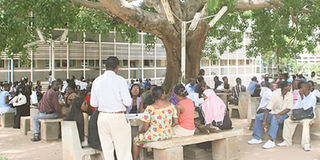INSIGHT: High hopes over Dar wireless service

University of Dar es Salaam students will be some of the first beneficiaries of the TV White Space wireless broadband service. PHOTO | FILE
What you need to know:
- TV White space technology being undertaken in Tanzania follows a similar project launched by Microsoft in Kenya in February this year, which uses solar power to deliver low cost wireless broadband to rural areas without previous access to broadband or reliable electricity.
Dar es Salaam. Higher learning institutions in Dar es Salaam are set to test a new form of wireless internet service provision through TV White space technology, which is earmarking its early entry into the country.
This follows a recent move by Microsoft Corp in collaboration with the Tanzania Commission for Science and Technology (Costech) and UhuruOne to announce a TV White space pilot project to provide affordable wireless broadband access to university students in Dar es Salaam.
The technology is an innovative, tested and affordable method of providing wireless broadband by tapping unused portions of wireless spectrum in frequency bands generally used for televisions.
TV White spaces (TVWS) are vacant frequencies made available for unlicensed use at locations where spectrum is not being used by licensed services, such as television broadcasting, making it highly desirable for wireless communication services.
The intervention and rollout of the technology is expected to curb the current high price of wireless broadband services experienced in Tanzania and many other African countries, which are, despite an improvement and remarkable integration and use of wireless broadband internet services.
The technology (pilot project) is scheduled to be deployed first at the University of Dar es Salaam and later to other higher learning institutions.
It is meant to help students in tertiary institutions tap into existing opportunities in wireless internet services for their studies.
The partnership will also enable UhuruOne, a local internet service provider in the country to offer Windows 8 device and service packages to higher learning institutions in Dar es Salaam.
Speaking at the launch of the project in Dar es Salaam, the Costech director general, Dr Hassan Mshinda, said: “We anticipate that tens of thousands of Tanzanian students and faculty members will be able to utilise wireless broadband packages offered by UhuruOne.”
Dr Mshinda was aware that although Africa had the highest growth rates for mobile broadband penetration in the world, wireless broadband services remained largely unaffordable throughout the continent.
“This pilot project seeks to improve that situation by focusing on access to broadband in education, an effort which will increase digital literacy, teach technical skills, advance e-learning and ultimately promote economic growth,” said Dr Mshinda.
These integrated solutions will include a Windows 8 laptop or tablet, wireless broadband connectivity and applications and services. The three partners are working with banks to offer small loans to cover the cost of packages.
The pilot project is expected to hire a team of students as on-campus support staff by offering affordable connectivity, devices and services for the network infrastructure.
Through the project, students will benefit not only from employment, but also from other opportunities to learn highly valued technical skills and gain qualifications for pursuing IT-related careers in the future.
For his part, Mr Mihayo Wilmore, founding partner of UhuruOne, said UhuruOne was not only an internet service provider, it was also social entrepreneurship-based, working to reduce the digital divide that had been in existence for many years.
“This project exemplifies our approach to connect underserved populations. We are committed to increasing affordability, accessibility and availability of broadband services in Tanzania and we are pleased to be working with Microsoft and Costech in this endavour,” Mr Wilmore said at the launch of the project in Dar es Salaam.
However, as the wireless industry becomes inherently more advanced, Spectrum Bridge’s technology continues to thrive as a growing necessity capable of revolutionising the way spectrum is managed.
TV White space technology being undertaken in Tanzania follows a similar project launched by Microsoft in Kenya in February this year, which uses White spaces and solar power to deliver low cost wireless broadband to rural areas without previous access to broadband or reliable electricity.
These pilot projects and similar initiatives are part of the Microsoft for Africa Initiative, a new series of investments designed to enable Microsoft to actively engage in Africa’s economic development and improve its global competitiveness.
As part of that effort, the company is committed to working with African governments to help drive clear understanding of the legal and regulatory environment needed for White space technology to be commercially deployed on a large-scale for the benefit of all Africans.
“After announcing our Mawingu pilot project in Kenya, Microsoft has been flooded with requests from a wide range of companies and governments interested in developing similar projects,” said Paul Garnett, director in Microsoft’s Technology Policy Group.
He added that White space technology and efficient spectrum management have the potential for expanding affordable broadband access throughout the world.
“We hope all governments will follow the example of forward-looking countries like Kenya, Tanzania and many others that have taken steps to support deployment of White space technology,” said Mr Garnett.




